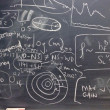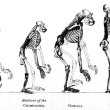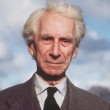Can We Make Sense of the World?
by Dr. Edward Feser
Filed under Cosmology

Is reality intelligible? Can we make sense of it? Or is the world at bottom an unintelligible “brute fact” with no explanation? We can tighten up these questions by distinguishing several senses in which the world might be said to be (or not to be) intelligible. To make these distinctions is to see that the questions are not susceptible of a simple Yes or No answer. There are in fact a number of positions one could take on the question of the world’s intelligibility – though they... Read More
Causality and Radioactive Decay
by Dr. Edward Feser
Filed under Science

NOTE: Today we finish our two part series by Dr. Edward Feser exploring questions about science, philosophy, causality, and radioactive decay. You can read the first part here. Now, if there must be causality at the macro level (at the very least in the case of the causal relations between the external world and our perceptual experiences of it), and this causality is not captured in the description of the world that physics itself gives us, then it follows that there is more... Read More
Fads and Fallacies in the Name of Science
by Dr. Edward Feser
Filed under Science

NOTE: Today we begin a two part series by Dr. Edward Feser exploring questions about science, philosophy, causality, and radioactive decay. We'll share the second part on Wednesday. At the Catholic blog Vox Nova, mathematics professor David Cruz-Uribe writes: "I… am currently working through the metaphysics of St. Thomas Aquinas as part of his proofs of the existence of God… [S]ome possibly naive counter-examples from quantum mechanics come to mind. For instance, discussing... Read More
Monogenism or Polygenism?: The Question of Human Origins
by Dr. Edward Feser
Filed under Anthropology, Evolution

NOTE: Today we finish our two part series by Dr. Edward Feser exploring questions about evolution, creation, faith, and human origins. You can read the first part here. How can the doctrine of original sin be reconciled with what contemporary biology says about human origins? For the doctrine requires descent from a single original ancestor, whereas contemporary biologists hold that the genetic evidence indicates that modern humans descended from a population of at least several... Read More
Knowing an Ape from Adam
by Dr. Edward Feser
Filed under Anthropology, Evolution

NOTE: Today we begin a two part series by Dr. Edward Feser exploring questions about evolution, creation, faith, and human origins. We'll share the second part on Friday. On questions about biological evolution, both the Magisterium of the Catholic Church and Thomist philosophers and theologians have tended carefully to steer a middle course. On the one hand, they have allowed that a fairly wide range of biological phenomena may in principle be susceptible of evolutionary explanation,... Read More
Can We Know God’s Existence with Certainty?
by Dr. Edward Feser
Filed under The Existence of God

The Catholic Church makes some bold claims about what can be known about God via unaided reason. The First Vatican Council teaches: "The same Holy mother Church holds and teaches that God, the source and end of all things, can be known with certainty from the consideration of created things, by the natural power of human reason… If anyone says that the one, true God, our creator and lord, cannot be known with certainty from the things that have been made, by the natural light of human... Read More
What is a Soul?
by Dr. Edward Feser
Filed under Anthropology

What is a soul? Or to be more precise, what is a human soul? Or to be even more precise, what is a human being? For that is really the key question; and I sometimes think that the biggest obstacle to understanding what the soul is is the word “soul.” People too readily read into it various erroneous notions (erroneous from an Aristotelian-Thomistic point of view, anyway)—ghosts, ectoplasm, or Cartesian immaterial substances. Even the Aristotelian characterization of the soul as... Read More
Debunking the “One God Further” Objection
by Dr. Edward Feser
Filed under The Existence of God

Philosopher Bill Vallicella recently replied to what might be called the “one god further” objection to theism. Bill sums up the objection as follows: "The idea, I take it, is that all gods are on a par, and so, given that everyone is an atheist with respect to some gods, one may as well make a clean sweep and be an atheist with respect to all gods. You don't believe in Zeus or in a celestial teapot. Then why do you believe in the God of Isaac, Abraham, and Jacob?" Or as the Common Sense... Read More
If Everything Requires a Cause, What Caused God?
by Dr. Edward Feser
Filed under The Existence of God

W. Norris Clarke’s article, “A Curious Blind Spot in the Anglo-American Tradition of Antitheistic Argument,” first appeared in The Monist in 1970. It was reprinted in his anthology titled The Creative Retrieval of St. Thomas Aquinas: Essays in Thomistic Philosophy, New and Old, which was published posthumously in 2009. I recently read the essay, and I did so with embarrassment and gratification. Embarrassment because I found that something I’ve been harping on for a few years now... Read More
Are Omnipotence and Omniscience Incompatible?
by Dr. Edward Feser
Filed under God's Nature

A reader recently asked for my response to this passage from Richard Dawkins’ The God Delusion: "Incidentally, it has not escaped the notice of logicians that omniscience and omnipotence are mutually incompatible. If God is omniscient, he must already know how he is going to intervene to change the course of history using his omnipotence. But that means he can’t change his mind about his intervention, which means he is not omnipotent." (pp. 77-78) We have here a clever rhetorical trick: Take... Read More







